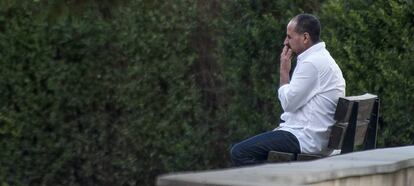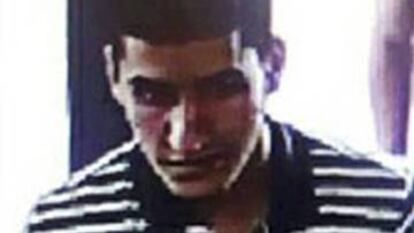“When we saw his face on the TV we couldn’t believe it:” Father of van driver in Barcelona attack
EL PAÍS talks to parents of terrorist who plowed vehicle into crowds in Barcelona killing 13 people

The parents of Younes Abouyaaqoub spend the morning outdoors in an out-of-the-way street in Ripoll, avoiding the dozens of journalists that have flooded into the hometown of the terrorists who staged the attacks in Barcelona and Cambrils last week.
Nobody noticed anything strange. What would we see?
Younes is the 22-year-old, the “exemplary student” and “great guy,” who killed 13 people on August 17 on Barcelona’s famous La Rambla promenade by accelerating into them with a Renault van. He was shot dead by police on Monday after a huge four-day manhunt.
At his parents’ side now, their two youngest children are busy coloring in. They are the siblings of Younes and of Houssaine, 20, killed by police after a second terrorist attack in Cambrils just hours after the Barcelona attack, and also of Hicham, 28, who has not been linked to the attacks.
The father’s voice is scarcely audible: “He is being described as a normal boy,” he says, referring to Younes and shaking his head. “I would go further and say he was a studious boy who worked and earned a living and didn’t get into trouble. Nobody noticed anything strange. What would we see? Of course he talked to the imam. But so did the other kids. What we didn’t know is that they met in secret in a van or in houses. We had no idea about that. You know they have to pretend. It’s part of what they do – pretend and hide what they think.”

Wearing a green veil, Younes’ mother is unable to speak. Every time she tries, she is choked by tears. “She’s devastated,” the father explains. “This is the first day she has got out of bed.”
Younes’ mother returned from Morocco on Wednesday evening, just hours before the attacks. Both she and Younes’ father found out about the attacks on the TV. They called Younes minutes later, but he wouldn’t answer his phone. But did they call him because they suspected he was involved or to tell him what had happened?
“Why would we suspect anything?” says Younes’ father. “We called the same way any parent calls their child to tell them something, but he didn’t pick up.”
Did they suspect something then? “Nothing… nothing,” says the man, shaking his head.
The fault lies with the police. How is such an imam allowed? Why didn’t they realize he was a dangerous man?
“When we found out, that’s when we started to go back over things, but still nothing seemed odd. They [the terrorists] pretend [everything is normal]…” he insists.
“The fault lies with the police. How is such an imam allowed here? Why didn’t they realize he was a dangerous man?” asks Younes’ father, referring to the imam Abdelbaki Es Satty who headed the cell behind the recent Catalonia terror attacks.
“They knew he was dangerous in Belgium and they threw him out. Why didn’t they do the same thing here? We are not to blame. How can anyone blame us?”
At this point, the parents ask politely to end the interview. They are shaken and Younes’ father’s voice is cracking. They are still waiting for the bodies of their two sons. They want to bury them in Morocco.
English version by Heather Galloway.
Tu suscripción se está usando en otro dispositivo
¿Quieres añadir otro usuario a tu suscripción?
Si continúas leyendo en este dispositivo, no se podrá leer en el otro.
FlechaTu suscripción se está usando en otro dispositivo y solo puedes acceder a EL PAÍS desde un dispositivo a la vez.
Si quieres compartir tu cuenta, cambia tu suscripción a la modalidad Premium, así podrás añadir otro usuario. Cada uno accederá con su propia cuenta de email, lo que os permitirá personalizar vuestra experiencia en EL PAÍS.
¿Tienes una suscripción de empresa? Accede aquí para contratar más cuentas.
En el caso de no saber quién está usando tu cuenta, te recomendamos cambiar tu contraseña aquí.
Si decides continuar compartiendo tu cuenta, este mensaje se mostrará en tu dispositivo y en el de la otra persona que está usando tu cuenta de forma indefinida, afectando a tu experiencia de lectura. Puedes consultar aquí los términos y condiciones de la suscripción digital.








































